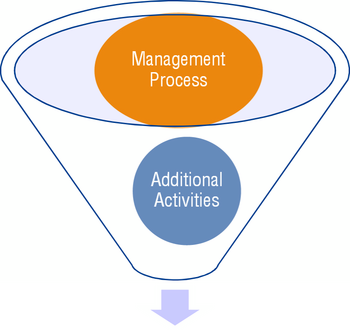
Management training to unlock your full leadership potential
Unlock your full potential with management training
‘If you pick the right people and give them the opportunity to spread their wings, you almost don’t have to manage them.’ – Jack Welch, former CEO of General Electric
Have faith in your people! THEY are the experts.
Take time to create an environment where you can develop your qualified and less-qualified
That is YOUR expertise!

The modules can also be customised to your specific needs and trained individually. Once you’ve provided me with a training goal, I’ll prepare an obligation-free training concept for you.
The following management process has a logical structure. It contains 10 modules. Assuming that a manager has taken on their new area of responsibility, I recommend following this structure.
In order for a manager to reflect a unified picture in the company, it’s important to know what their boss expects from them.
Comments
Having regular discussions with your manager means consciously taking a look at yourself. Mutual appreciation of character and abilities means a manager has a positive influence. This positive influence strengthens the manager’s position and makes it easier to lead employees.

In my training courses and discussions with managers, I have seen that a person’s desire to improve their own time management and self-management only really develops after many years in the job. Usually when the demands of work have a negative impact on their wellbeing.
Comments
Being actively aware of time has a significant impact on all areas of a manger’s life. Having a structure for implementing important goals provides a manager with an overview of their time management.
Every manager should consider having a relationship-building talk with their staff when they start their new position.
Putting excessive expectations on employees can result in a head-on collision with their expectations.
If employees don’t accept what the manager is trying to motivate them to do, it can result in less personal commitment in the workplace.
Both of these affect the relationship between the manager and staff.
Comments
Using strong communication techniques helps maintain different motivations. These talks provide a manager with information about the communication level with employees: is there a good relationship or not?
Talking with employees in their work environment is the ideal way to analyse what motivates them. Performance motivators are part of an employee’s requirements profile. This provides managers with clear information that they can use to produce such things as a quality assessment.
Comments
Talks at the employee’s workstation are a special form of recognition. These should be the first talks done in the escalation stages of communication.
Changing an employee’s behaviour or way of thinking can be done in two different ways: by good arguments or by exerting authority. Using persuasive arguments that you have gathered from your employees themselves improves the chances of mutual understanding.
Comments
It is a challenge for managers to become masters at arguing convincingly in order to change employee behaviour. However, being able to do this helps managers to avoid exerting their formal authority too soon.
This module provides an insight into the importance of communication and helping employees to achieve goals.
Comments
How well goals are structured has a significant influence on the formulation and implementation of communicating goals. The manager understands that important decisions are always based on well structured goals.
Employees also have their own goals. Supporting and encouraging these is a special challenge for managers. The reason for this is that, unlike the previous module, here the manager’s point of view has to take second place.
Comments
After this seminar, the manager can distinguish between ‘developing employees’ and ‘managing employees’. When employees see that they are being developed, it has a positive influence on their identification with the company and their commitment to their manager.

Conducting a guidance review influences 4 areas:
Comments
The manager is in a position to distinguish between employees who need monitoring and those who don’t. The manager understands that employees should be trained on the job. Permanent training results in actions becoming automatic and guarantees success. The manager as a strong personality leads the way!
The second escalation phase in communication is asserting authority.

Authoritative discussions can be divided into three stages:
In practice, an appraisal review is often prepared by both the employee (self-assessment) and their manager (professional, behavioural and personality). As a result, these discussions are often like haggling at a flea market. An appraisal review should be based on figures, data and facts.
Comments
The manager is aware that appraisal reviews strongly tend towards authoritative communication. Managers must be able to substantiate their assessment by involving themselves in the personal development of their employees.
Training for additional activities complements training for the management process.
There are many times when a manager is called upon to make presentations. Often managers are unaware of what impact their presenting style has on the people present (unknowingly incompetent).
Comments
The manager is more aware of when it’s the right decision to give a presentation. The manager understands the training effort required. The manager understands how body language draws attention and how they come across to others.
Moderating is always a good way of extracting your employees’ know-how on specific tasks.
Comments
A manager needs to send out signals within their team. A manager needs to be accepted as a competent leader. Every moderation session must have a purpose, actively involve employees, be structured and have specific follow-up actions. The manager can decide when it’s the right time to use moderation.
Managers quickly make decisions in their heads or on paper. However, the quality of how these decisions are communicated is the benchmark for their influence on, and acceptance by, employees.
Comments
The manager is more aware of making decisions and can live with their consequences. The manager accepts that sometimes making decisions is sometimes a bitter pill to swallow but that it is an important management skill. The manager knows that postponing a decision means it will be even more difficult to implement in the future.

Job interviews are a regular part of a manager’s job. It has been proven that the most frequent cause of ‘divergency’ is how both sides behave. The aim is to find the right person for the right job.
Comments
The manager is able to use the right interview techniques. The applicant’s answers provide clear insight into future behaviour.
Conflicts between employees or between managers and employees occur because they do not have the right skills to prevent conflicts arising in the first place.
Comments
The manager recognises and senses poor communication at the relationship level. The manager is aware that solving conflicts also involves making decisions. The manager can sell different scenarios and illustrate different points of view.
Due to time limitations, it is often the case that goal-setting discussions, assessment appraisals and personal development discussions are integrated into a single employee discussion.
Comments
All of the concepts that I give you can be adapted to your own processes. The prerequisite for this is your cooperation in providing the necessary information (for example: appraisal forms, interview forms).
Managers see it as a special distinction to delegate responsibility to an employee. How well the employee handles this responsibility provides a manager with an insight into their abilities and what motivates them to perform.
Comments
The manager can distinguish between their own interests and those of their employees to develop themselves. The manager knows the objectives and conditions for delegating. The manager knows the time and effort required to provide support. Employees are motivated by being delegated a responsibility.

If employees don’t know that they don’t know something, then leadership is required. Employees need full attention to develop missing skills with the assistance of their manager.
Comments
The manager can differentiate between coaching and managing. The manager knows the value of empathy. The manager understands the requirements for successful coaching.
The many different types of situations requiring communication with employees also require different leadership styles.
Comments
Training in different leadership styles with different leadership situations consolidates a manager’s leadership skills.

You' ll never walk alone
0151 / 25351294